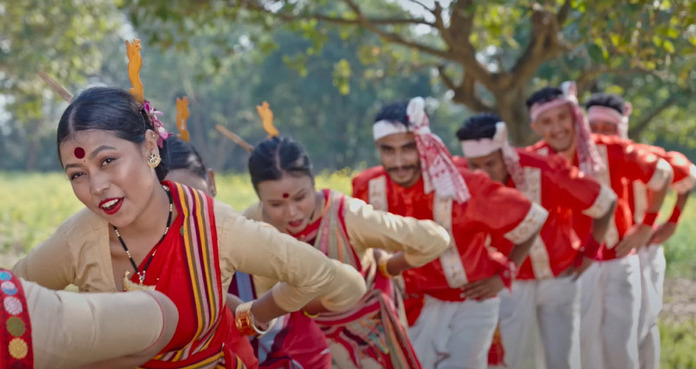Assam Tourism Shine with Cultural Festival Rongali Bihu
Immerse in the vibrant Rongali Bihu, Assam's heartwarming festival of dance, tradition, and the joyous Assamese New Year. The post Assam Tourism Shine with Cultural Festival Rongali Bihu appeared first on Travel And Tour World.


Immerse in the vibrant Rongali Bihu, Assam‘s heartwarming festival of dance, tradition, and the joyous Assamese New Year.
Rongali Bihu, also known as Bohag Bihu, is the most celebrated festival of the Assamese people and signifies the start of the Assamese New Year, Rongali Bihu is celebrated from April 14. This seven-day festival, integral to Assam Tourism, is observed in April each year and marks a period of gratitude and hope. It’s a time when locals thank the Almighty for a bountiful harvest and seek blessings for a prosperous year ahead. Furthermore, Rongali Bihu is a vibrant celebration of nature, with the spring season bringing a picturesque display of blooming flowers and lush greenery.
The festivities of Rongali Bihu begin with Garu Bihu, a day dedicated to cattle, reflecting deep respect for these animals in Assamese culture. The joyous mood continues on the second day as young people gather in open spaces or naamghor bakoris to perform Bihu songs and dances, showcasing the rich cultural heritage pivotal to Cultural Tourism in Assam. The third day, Guxai Bihu, involves worshiping household deities, while the fourth day, Tator Bihu, celebrates the significant role of handlooms, an artisanal cornerstone of Assamese culture.
Nangolor Bihu, the fifth day, honors farm equipment, emphasizing the deep connection of the Assamese community with agriculture—a key aspect of Assam Tourism. The sixth day, GharosiaJibar Bihu, focuses on domestic animals like cows, goats, and buffaloes, praying for their health and prosperity. The festival culminates on Chera Bihu, where community bonds are strengthened through traditional dances such as Bihu and Husori, exchange of greetings, and communal feasts.
The festive week also sees the exchange of Pithas, traditional Assamese delicacies, among friends and relatives, enriching the communal spirit. The Bihu dance, performed by men and women in exquisite traditional Assamese attire made from muga silk, is a highlight of the celebration. Accompanied by traditional musical instruments like the pepa, gogona, dhol, toka, taal, hutuli, etc., these dances are a vital part of Cultural Tourism in Assam.
Rongali Bihu or Bohag Bihu is a cornerstone of Assamese culture and an important event for Assam Tourism, symbolizing the state’s rich agricultural base and vibrant cultural heritage. It is a festive time that brings together people across Assam to celebrate the bounty of nature, express gratitude for a good harvest, and pray for prosperity in the year to come.
Traditional Food prepared in Bohag Bighu
During Rongali Bihu, an array of traditional Assamese dishes are prepared, showcasing the rich culinary heritage integral to Assam Tourism. These dishes often incorporate local ingredients like rice, coconut, jaggery, sesame, and milk. Among the beloved treats are tilor ladoo or laru, delightful balls made from sesame seeds and jaggery, and ketli pitha or tekeli pitha, a hearty dish combining rice, jaggery, and coconut into a crumbly texture, wrapped in cloth and steamed to perfection.
Another popular sweet is tel pitha, prepared with rice flour and jaggery during Bihu festivities. Muri ladoo or laru, crafted from puffed rice, is another crowd-pleaser. Various forms of rice such as xandoh, chira, muri, komal saul or bora saul are typically served with curd or cream and jaggery, offering a delightful blend of textures and flavors. Gila pithe, fried sweet dumplings made from rice flour, sticky rice, and jaggery, are similar to the Bengali version but hold a distinct place in Bihu celebrations.
For the savory palate, maasor tenga, a tangy fish curry made with local tenga fish and spices, offers a taste of Assam’s riverine bounty. Poka mithoi, round balls formed from rice dough and sweetened with jaggery syrup, and laai xaak pitha, a unique curry made with the alkaline ingredient ‘khar,’ are also essential parts of the festive menu. Bora saulor pitha, combining rice and jaggery, is another famous sweet dish savored during this time.
Impact Bihu on Assam Tourism
The celebration of Rongali Bihu significantly boosts Cultural Tourism in Assam. The festival draws numerous visitors, both domestic and international, eager to experience the unique cultural practices and vibrant traditions of the state. It provides an excellent opportunity for tourists to explore the scenic beauty of Assam, from its lush tea gardens and misty blue mountains to its diverse wildlife.
Rongali Bihu not only offers a chance to witness traditional Assamese dances and musical performances but also allows tourists to indulge in the delectable array of Bihu delicacies. The festival is characterized by a spirit of joy and communal harmony, with young men and women donning traditional clothes made from locally produced Assamese silk to perform the group Bihu dance, the folk dance of Assam. During the festival, women prepare laru and peetha, staples made from rice, while the younger generation honors the elderly with the gamusa, a traditionally woven red and white towel, embodying the respectful and familial ethos of Assamese culture.
The influx of tourists during Rongali Bihu provides a substantial lift to the local economy and highlights Assam as a key destination for Cultural Tourism. Although specific numbers of foreign visitors are not readily available, the festival’s appeal is evident in the vibrant boost it gives to the tourism industry, making it a pivotal event for those looking to immerse themselves in the rich tapestry of Assam’s cultural life.
Your article on the Rongali Bihu festival in Assam is rich with details and offers a comprehensive guide for visitors looking to immerse themselves in this vibrant cultural celebration. Here’s a refined and enhanced version of your text:
Explore the Vibrant Rongali Bihu Festival in Assam
During the Rongali Bihu festival, Assam transforms into a vibrant hub of culture and tradition, offering visitors a plethora of engaging activities and beautiful sites. Here are some top places to visit during the festival for an authentic cultural experience:
- Goriating Bihu Khula – Nestled in Dhalakhat Bagan Gaon, this popular location comes alive during Rongali Bihu. It’s an ideal spot for experiencing traditional festivities, rated 3.9 based on 8 reviews on Google Maps.
- Bihutoli – Located in Duliajan Oil Town, Bihutoli is a cultural center that showcases traditional Assamese dance and music. It is a must-visit for cultural enthusiasts, boasting a rating of 4.2 with 1,041 reviews on Google Maps.
- PhatoBihu-Mohghuli Chapori – This scenic location offers a picturesque backdrop for Bihu celebrations, with a Google Maps rating of 4.4 from 215 reviews. It’s perfect for those looking to combine cultural festivities with natural beauty.
In addition to these locations, Assam hosts numerous cultural programs and events throughout the Rongali Bihu festival. Highlights include traditional dance performances, music concerts, and community feasts, allowing visitors to delve deep into Assam’s rich cultural tapestry.
Immersive Cultural Experiences
Visitors to Assam during Rongali Bihu can enjoy a variety of traditional activities that showcase the state’s cultural heritage:
- Traditional Assamese Clothing: Experience the festival in authentic local style by donning traditional attire. Men typically wear a dhoti and gamosa, while women dress in the elegant mekhela sador.
- Bihu Dance: Participate in or watch the energetic Bihu dance, a traditional form that symbolizes the spirit of Assam.
- Assamese Music: Immerse yourself in the melodious sounds of traditional music and perhaps even try playing an Assamese instrument.
- Culinary Delights: Sample traditional dishes such as pitha and laru, made from local ingredients like rice, coconut, and jaggery, essential flavors of the festival.
- Community Feasts: Join locals in communal feasts, a wonderful opportunity to bond over food and share stories.
- Natural Beauty: Take time to explore Assam’s stunning landscapes, from lush tea gardens to the majestic blue mountains and rich wildlife sanctuaries.
Rongali Bihu in Assam is not just a festival; it’s a profound celebration of life, nature, and culture. It’s an ideal occasion for visitors to explore the cultural richness of Assam, participate in age-old traditions, and create memories that last a lifetime. Whether you’re drawn to traditional dances, music, exquisite food, or simply the scenic beauty of the region, Rongali Bihu offers something for every traveler.
The post Assam Tourism Shine with Cultural Festival Rongali Bihu appeared first on Travel And Tour World.
















